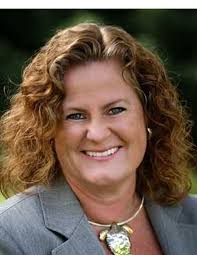A conversation with Dede Kennedy-Simington, president of BenAssist Health Insurance Services, Pasadena, California.

After college I began my professional life with my father, James P. Kennedy. Dad was one of the pioneers of self-funding in the 70’s, and owned a Third Party Administrative (TPA) firm. Fast-forward through many iterations of working in healthcare: from running enrollment for Access for Infants and Mothers (AIM) (the state-funded insurance program for pregnant women), managing contracting for a psychiatric hospital, being in the C-Suite at male-dominated brokerages, taking stock of my life with a five-month backpacking trip to Asia at age 30, stints working as an independent agent for others, then returning to owning my own agency two years ago. Job and major account losses taught me as much as successes in gaining the musculature I now possess. Those losses were learnings and propelled me to change.
I had two children later in life (at 37 and 40), and my husband and I appreciated this industry’s flexibility. Having kids continually makes me take stock of my priorities. We have to keep the pressure on workplaces to adapt to both women and men as parents, in a humane way. Truly, we can NOT have it all–we have to make compromises.
I was trained to fit into the rigid masculine corporate space of our culture. It took years for me to feel confident to go out completely on my own, without sharing the helm with male leadership. That path led me to confidently knowing I’m at the top of my game, able to be uniquely me, and expertly do what I do. I have dual passions: serving as chair (again) of the Legislative Committee of LAAHU, and building my employee benefit practice in the cannabis industry. I love lobbying in both Sacramento and D.C. It’s given me tremendous knowledge of trends and the drama of that theater keeps me inspired.
Talk about drama! The cannabis space is incredibly dynamic and fascinating. What a unique challenge to apply the fundamentals of employee benefits to this nascent, contradictory industry that is bringing about nuanced economic, cultural, societal and political shifts. Cannabis companies have many idiosyncrasies, and investors as a rule don’t understand nor anticipate health and welfare regulations. How do we project risk accurately? Will claims be different? How and when do we work with insurance companies to cover medicinal marijuana? I’m having the time of my career.
My reading list? I keep going back to Blue Ocean Strategy by W. Chan Kim and Renée Mauborgne. The metaphor of red and blue oceans describes the market universe. Red oceans are characterized by cutthroat competition which turns the ocean bloody; hence, the term “red oceans”.
Blue oceans, in contrast, denote all the industries not in existence today–the unknown market space, untainted by competition. In blue oceans, demand is created rather than fought over. There is ample opportunity for growth that is both profitable and rapid. In blue oceans, competition is irrelevant because the rules of the game are waiting to be set. Blue ocean is an analogy to describe the wider, deeper potential of market space that is not yet explored.
Life philosophy? People first.
— Linda Lalande
